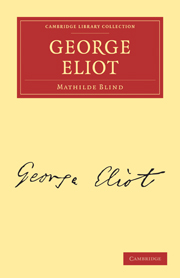Book contents
- Frontmatter
- PREFATORY NOTE
- Contents
- CHAPTER I INTRODUCTORY
- CHAPTER II CHILDHOOD AND EARLY HOME
- CHAPTER III YOUTHFUL STUDIES AND FRIENDSHIPS
- CHAPTER IV TRANSLATION OF STRAUSS AND FEUERBACH — TOUR ON THE CONTINENT
- CHAPTER V THE “WESTMINSTER REVIEW”
- CHAPTER VI GEORGE HENRY LEWES
- CHAPTER VII SCENES OF CLERICAL LIFE
- CHAPTER VIII ADAM BEDE
- CHAPTER IX THE MILL ON THE FLOSS
- CHAPTER X SILAS MARNER
- CHAPTER XI ROMOLA
- CHAPTER XII HER POEMS
- CHAPTER XIII FELIX HOLT AND MIDDLEMARCH
- CHAPTER XIV DANIEL DERONDA
- CHAPTER XV LAST YEARS
- THE PROPHECY OF SAINT ORAN: AND OTHER POEMS
CHAPTER XIV - DANIEL DERONDA
Published online by Cambridge University Press: 07 September 2011
- Frontmatter
- PREFATORY NOTE
- Contents
- CHAPTER I INTRODUCTORY
- CHAPTER II CHILDHOOD AND EARLY HOME
- CHAPTER III YOUTHFUL STUDIES AND FRIENDSHIPS
- CHAPTER IV TRANSLATION OF STRAUSS AND FEUERBACH — TOUR ON THE CONTINENT
- CHAPTER V THE “WESTMINSTER REVIEW”
- CHAPTER VI GEORGE HENRY LEWES
- CHAPTER VII SCENES OF CLERICAL LIFE
- CHAPTER VIII ADAM BEDE
- CHAPTER IX THE MILL ON THE FLOSS
- CHAPTER X SILAS MARNER
- CHAPTER XI ROMOLA
- CHAPTER XII HER POEMS
- CHAPTER XIII FELIX HOLT AND MIDDLEMARCH
- CHAPTER XIV DANIEL DERONDA
- CHAPTER XV LAST YEARS
- THE PROPHECY OF SAINT ORAN: AND OTHER POEMS
Summary
‘Daniel Deronda,’ which appeared five years after ‘Middlemarch,’ occupies a place apart among George Eliot's novels. In the spirit which animates it, it has perhaps the closest affinity with the ‘Spanish Gypsy.’ Speaking of this work to a young friend of Jewish extraction (in whose career George Eliot felt keen interest), she expressed surprise at the amazement which her choice of a subject had created. “I wrote about the Jews,” she remarked, “because I consider them a fine old race who have done great things for humanity. I feel the same admiration for them as I do for the Florentines. Only lately I have heard to my great satisfaction that an influential member of the Jewish community is going to start an emigration to Palestine. You will also be glad to learn that Helmholtz is a Jew.”
These observations are valuable as affording a key to the leading motive of ‘Daniel Deronda.’ Mordecai's ardent desire to found a new national state in Palestine is not simply the author's dramatic realisation of the feeling of an enthusiast, but expresses her own very definite sentiments on the subject. The Jewish apostle is, in fact, more or less the mouthpiece of George Eliot's own opinions on Judaism. For so great a master in the art of creating character, this type of the loftiest kind of man is curiously unreal. Mordecai delivers himself of the most eloquent and exalted views and sentiments, yet his own personality remains so vague and nebulous that it has no power of kindling the imagination.
- Type
- Chapter
- Information
- George Eliot , pp. 192 - 203Publisher: Cambridge University PressPrint publication year: 2010First published in: 1883

